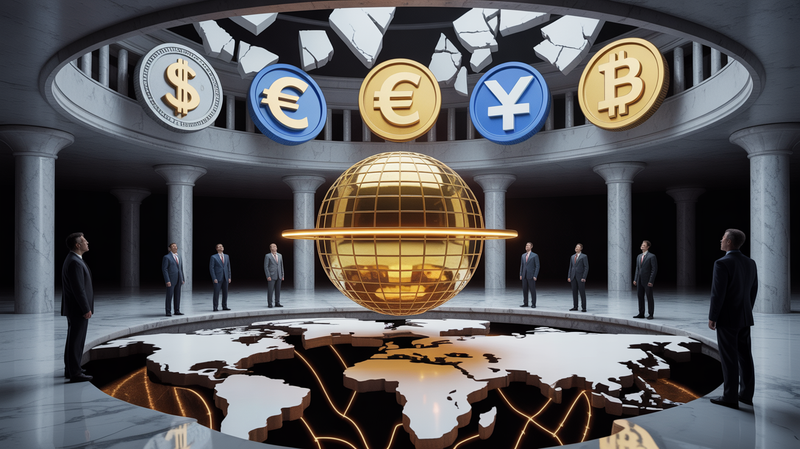Navigating the Currency Crossroads: Hong Kong's Impending Monetary Dilemma
Hong Kong's currency, which has long been pegged to the US dollar, is facing its most significant challenge since the global financial crisis of 2008. This arrangement, in place for nearly four decades, is a cornerstone of Hong Kong's financial stability and prosperity. However, increasing pressure

Hong Kong's currency, which has long been pegged to the US dollar, is facing its most significant challenge since the global financial crisis of 2008. This arrangement, in place for nearly four decades, is a cornerstone of Hong Kong's financial stability and prosperity. However, increasing pressure on the local currency and external geopolitical tensions are prompting some experts to propose unpegging the Hong Kong dollar from the US dollar.
Hong Kong's de facto central bank has had to expend substantial resources buying its currency to maintain the peg due to the prevailing uncertainties about Hong Kong's future as an international financial center. Interest rate differentials between Hong Kong and the US, along with political pressure from Beijing, have contributed to an unfavorable outlook for the city as a global financial hub.
A crucial indicator of this strain is the rapid decline of Hong Kong’s aggregate balance, a measure of the banking system's liquidity. It has decreased more than 90% from its peak in 2021, demonstrating an evident investor shift away from the Hong Kong dollar. Despite this, city officials assure that there are sufficient foreign reserves to support the currency.
Critics argue that the currency peg to the US dollar is unsustainable. Independent economist Andy Xie suggests that Hong Kong is becoming overly influenced by US monetary policy. He advocates for a shift to the Chinese yuan, which could bolster Hong Kong's financial standing as global yuan demand grows.
In contrast, Logan Wright, from Rhodium Group, suggests that the risks to the Hong Kong dollar peg arise primarily from market uncertainties about Beijing's currency intentions. The potential capital leakage from China via Hong Kong may prompt Beijing to take action if the cash flight escalates.
Over the past year, the Hong Kong dollar has frequently been pushed to the weak end of its permitted trading band. This pressure has resulted in substantial intervention by the Hong Kong Monetary Authority (HKMA), costing around $37 billion, to maintain its value. While much of this pressure comes from geopolitical issues and slowing investment flows, US interest rate hikes have also played a significant part.
The aggressive US interest rate hikes have prompted traders to engage in carry trade, borrowing Hong Kong dollars to buy higher-interest US assets. This practice has been facilitated by Hong Kong banks' slower pace in raising market rates compared to their US counterparts, despite HKMA's attempt to mirror the Fed's rate increases.
Furthermore, the city's economic recovery from the Covid-19 pandemic is being hampered by the rising interest rates. The city’s property market, already stressed by political turmoil and capital exodus, is feeling additional pressure. Critics argue that the economic and social costs of maintaining the peg to the US dollar have become untenable.
On the other hand, there are voices cautioning against dropping the dollar peg, arguing that it plays a crucial role in Hong Kong's function as an international financial center. As a substantial portion of Asia's trade and capital transactions are denominated in US dollars, pegging the Hong Kong dollar to the US dollar encourages such transactions to take place in Hong Kong and under Hong Kong law. This setup not only creates jobs and prosperity in Hong Kong but also benefits mainland China.
The proposition of pegging the Hong Kong dollar to the Chinese yuan instead is met with skepticism. As the Chinese currency is subject to strict capital and exchange controls, its adoption in Hong Kong could mean the imposition of some of China’s financial controls on the city. This change could undermine the city's ability to function as an international financial center.
Hong Kong is thus at a crossroads. Maintaining the status quo continues to strain the city's financial resources and aligns it with potentially unfavorable monetary policies. However, changing the system might hurt its status as a financial hub and introduce other complications. Navigating this challenging monetary landscape requires a balance between political realities, economic needs, and financial sustainability.
Supporters of the current peg, like John Greenwood, one of the architects of the current system, argue that Hong Kong's dollar peg has weathered numerous crises, including the Asian financial crisis, SARS outbreak, the collapse of Lehman Brothers, and the Covid-19 pandemic. Thus, there may be no compelling reason to disrupt this resilience.
However, the increasing political integration with mainland China and the city's altered legal and institutional structure following the implementation of the National Security Law in 2020 put new pressures on the existing monetary arrangement.
Wright from Rhodium Group points out that running two separate currencies and monetary policies within one sovereign country is unusual in global finance. Hong Kong's open market environment, which has been a key advantage in connecting mainland China to global finance, could turn into a vulnerability if capital flight from China intensifies. In such a case, Beijing may have no choice but to intervene, regardless of Hong Kong authorities' preferences.
The alternative of pegging the currency to China's yuan, as suggested by economist Andy Xie, has its pros and cons. On the one hand, the yuan's lower interest rates due to lower inflation could stabilize Hong Kong's markets, insulating them from potential future US inflation or interest rate hikes. Furthermore, as the yuan's share in global payments and reserves increases, Hong Kong could benefit from this rise.
On the other hand, the yuan's strict capital and exchange controls could hinder Hong Kong's role as an international financial hub. Adopting the yuan could imply the imposition of some of China’s financial controls on Hong Kong or significant convergence of the city's and mainland Chinese financial systems. In the words of Greenwood, Hong Kong would not be able to operate a system that was fully and freely convertible to the mainland currency without undermining some of China's financial controls.
In the short term, it seems unlikely that any drastic change will occur. Eddie Yue, chief executive of the HKMA, maintains that local banks have had no issues with liquidity. Moreover, S&P Global Ratings continue to expect the HKMA to maintain a pegged exchange rate regime and ensure financial stability with regulatory measures.
Yet, in the longer term, as Beijing's grip on the city tightens and the global economic landscape evolves, the question of whether to maintain, adjust, or abandon the dollar peg will remain an ongoing debate. The outcome of this discussion will inevitably have far-reaching implications for the financial future of Hong Kong and its role as a bridge between China and the rest of the world.




